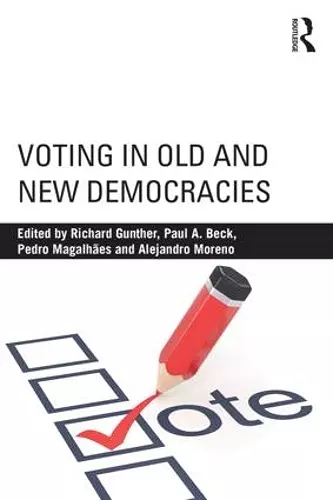Voting in Old and New Democracies
Richard Gunther editor Pedro C Magalhães editor Paul A Beck editor Alejandro Moreno editor
Format:Paperback
Publisher:Taylor & Francis Ltd
Published:7th Aug '15
Currently unavailable, and unfortunately no date known when it will be back
This paperback is available in another edition too:
- Hardback£155.00(9781138913318)

Voting in Old and New Democracies examines voting behavior and its determinants based on 26 surveys from 18 countries on five continents between 1992 and 2008. It systematically analyzes the impact on voting choice of factors rooted in the currently dominant approaches to the study of electoral behavior, but adds to this analysis factors introduced or reintroduced into this field by the Comparative National Elections Project (CNEP)—socio-political values, and political communication through media, personal discussion, and organizational intermediaries. It demonstrates empirically that these long-neglected factors have significant political impact in many countries that previous studies have overlooked, while "economic voting" is insignificant in most elections once long-term partisan attitudes are taken into consideration. Its examination of electoral turnout finds that the strongest predictor is participation by other family members, demonstrating the importance of intermediation. Another chapter surveys cross-national variations in patterns of intermediation, and examines the impact of general social processes (such as socioeconomic and technological modernization), country-specific factors, and individual-level attitudinal factors as determinants of those patterns. Complementing its cross-national comparative analysis is a detailed longitudinal case study of one country over 25 years. Finally, it examines the extent of support for democracy as well as significant cross-national differences in how democracy is understood by citizens.
Written in a clear and accessible style, Voting in Old and New Democracies significantly advances our understanding of citizen attitudes and behavior in election settings.
'This book is essential reading for all scholars interested in the democratic role of elections. Analyzing a unique database consisting of survey data from 18 countries it provides important new insights into the relevance of political intermediation through the communications of mass media, political organizations and ordinary citizens for democratic politics on a global scale.'—Rüdiger Schmitt-Beck, University of Mannheim
'This insightful book makes productive use of innovative survey questions from a wide range of countries to shed light on long-neglected questions regarding how voters acquire and direct their concerns onto the objects of electoral choice: political parties. In so doing the study introduces an apparently new term to the lexicon of political behavior: "political intermediation." The study uses this concept as a lens with which to focus attention on the role of intermediaries (family, friends, the media, and social groups) in framing political choices: roles that appear to condition decisions in the voting booth.' —Mark N. Franklin, European University Institute
‘La evidencia presentada en Voting in Old and New Democracies ensancha la agenda de investigación sobre el comportamiento político-electoral en el mundo, poniendo sobre la mesa la importancia de factores como los canales de intermediación política –que influyen en la relación entre partidos políticos y ciudadanos–, los cuales suelen estar ausentes en el análisis de la decisión de voto. Dicha contribución, sumada a la relevancia que se le da al proceso de modernización –ahora experimentado a través de cambios tecnológicos que se viven en el mundo con el uso de las redes socio-digitales y el Internet– indican que el estudio comparado del comportamiento electoral es todavía una agenda de investigación abierta a nuevas explicaciones teóricas y hallazgos novedosos. Voting in Old and New democracies contribuye a ello.’—Isaac Cisneros, Perfiles Latinoamericanos
'Voting in Old and New Democracies is a tour de force that dramatically improves scholarly understanding of why and how people turn out to vote and vote the way they do in a diverse group of democracies that vary dramatically in terms of their age, consolidation, level of economic development, and democratic quality. It is a book that I encourage all scholars of electoral behavior to read, and to read carefully.'—Mark P. Jones, Latin American Politics and Society
'Altogether, this is a very strong volume that clearly identifies both the strengths and limitations of comparative studies. It should find a place in every reading list on undergraduate and postgraduate modules in comparative political behaviour. It should also serve as a very reliable primer to more experienced researchers who need both a guide to the known terrain and a clear map as to where we go next.'—John Bartle, Party Politics
ISBN: 9781138913325
Dimensions: unknown
Weight: 476g
342 pages